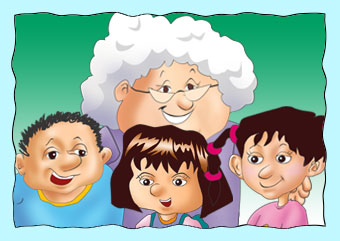Grammar: Word classes: Determiners: Referring to specific people, things, etc
| Overview |
What are specific determiners?
We use specific determiners to point (or refer) to specific people, animals, things and events.
In the example below, by using the specific determiner her, the storyteller is pointing to specific grandchildren, ie to Granny Gong's grandchildren:
| Granny Gong and her
grandchildren had upset MegaMonster. Pointer Thing determiner noun |
 |
By using the specific determiner this, Granny points to a specific bottle, ie to the bottle
she is holding up, as in the example below:
| "Can you get into this
bottle?" said Granny. Pointer Thing determiner noun |
 |
We use specific determiners to refer to specific people, animals, things and events:
| Specific determiners | |
| definite article (the) | The children couldn't catch the ghost. |
| demonstratives (this, that) | "Get into this bottle," said Granny Gong. |
| possessives (my, your, his/her) | Granny Gong called her grandchildren. |
| interrogatives (whose, which) | "Whose harbour is this?" smiled MegaMonster. |
| For a summary of the relationship between the form and the functions of specific determiners, click here: |  |
For more information, click on the menu on the left:
Definite article
(the)
Demonstratives (this, that)
Possessives
(my, your, his)
Interrogatives
(which, what, whose)
Note that the terms Pointer and Thing are written with an initial capital letter to remind us that they are functional terms.
|
Alternative terms |
|
| PrimeGram | Other grammars |
| Pointer | Deictic |
|
||
To give us feedback about this section, click here or on the Comment button at the top of the screen.
If you have any questions about this section, visit the Language Corner.
If you have any questions or suggestions about how to teach this section, send a message to the Teaching Corner.